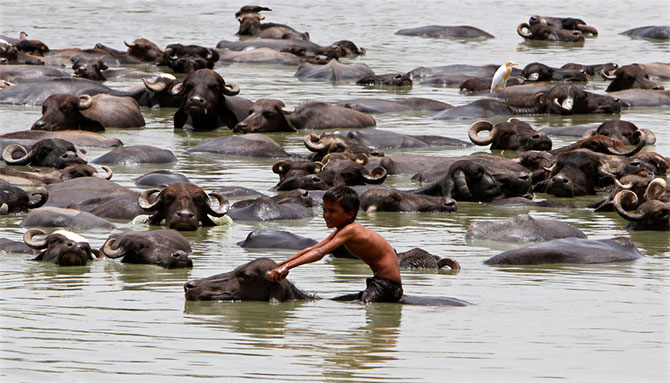 | « Back to article | Print this article |
Because of weak availability, buffalo meat exports have also declined over the last few weeks

Buffalo meat prices have surged by over 14 per cent in the last one week due to lower availability of animals for slaughtering amid government's order to ban on their sale.
Around the national capital, buffalo meat is sold at Rs 150-160 a kg now, a rise of Rs 15-20 in the last one week.
This means, buffalo meat was available normally between Rs 135-140 a kg before the government notification banning sale of animals for slaughtering issued on May 24.
The ban on animals' sale for slaughtering was intended to control mushrooming of unregistered slaughtering houses in the country, in addition to prevent their cross-border sale.
However, the local meat and leather industries, with an accumulative exports of $10 billion, are likely to get impacted badly. Apart from that, millions of skilled and unskilled workers across the two industries are going to be jobless with just one regulation.
"Buffalo meat prices are quoted today at Rs around Rs 160 a kg here which indicates a rise of Rs 20 about a week ago. Buffalo supply to mandis as people create problems in transportation.
Supply, however, continues in fewer numbers. Because of weak availability, buffalo meat exports have also declined over the last few weeks," said Bushran Zakariya, Director, Zakariya Agro Pvt. Ltd, another buffalo meat retailer and exporter based out of New Delhi.
Along with buffalo meat, prices of chicken and goat / sheep meat have also jumped by Rs 20-30 a kg in the domestic markets due to a sharp increase in their demand following shifting of consumers from buffalo meat to chicken and goat / sheep meat. To compensate lower supply, Indian exporters are seeking $50-75 a tonne higher from overseas buyers for spot booking.
According to Mohammad Zubair Nagani, Director of M U N Agro Industries Pvt Ltd, a Vashi-based Apeda (Agricultural & Processed Food Products Export Development Authority) - registered meat producer, prices of all meat products have jumped by upto 20 per cent since talks over ban on animal slaughter started.
With the supply of animals getting badly disrupted for slaughtering due to beating of buyers by the politically-connect people, buffalo meat and live animals prices in the international markets have also risen. Live cattle futures for neat month delivery has jumped by 5.2 per cent since May 24 to trade currently at US cents 126.2 / lb. The future has witnessed 8.7 per cent jump in calendar 2017.
"Around 90 per cent of meat supply is procured from the market place. While leather industry has not put any precise figure of its procurement of raw material from the market place, we presume a major chunk of the leather consumption is dependent on markets for supply of raw materials.
Hence, the impact of ban on animal slaughtering would be felt in the months to come. We have written to the government raising concerns of the industry which, we are sure, of the government's positive view on the same especially when job creation continues to be a priority," said Ajay Sahai, Director General, Federation of Indian Export Organisation (FIEO).
Meanwhile, data compiled by Apeda showed India's overall meat exports declined by over 11 per cent to 85,119 tonnes in volume term and 10.45 per cent in value terms to $257 million in April 2017. Buffalo meat contributes nearly 25 per cent of India's overall agri exports from India.
"We have developed the industry to this level in the last several years. The industry is working on with the government to take out buffalo out of this legislation which, we believe, the government would do.
Since, the implementation time is given for three months for the ban on sale of animals, a majority of abattoirs and animal mandis are currently working as usual," said Qaiser Hussain Qureshi, proprietor of Marhaba Frozen Foods, a New Delhi-based dealer of frozen foods and buffalo meat exporter.
Photograph: Amit Dave/Reuters